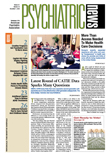Except in the law, there is no formal boundary between youth and adulthood. That's a good point to remember when young people treated for attention-deficit/hyperactivity disorder (ADHD) become old enough to vote and migrate from pediatricians to adult internists for their medical care, said Paula Riggs, M.D., an associate professor of psychiatry at the University of Colorado School of Medicine.
“There's nothing magical about turning 18,” said Riggs, in an interview with Psychiatric News. “Some young people with ADHD have symptoms that continue into adulthood, so there's no cut point.”
If medications have worked to control symptoms, there is no indication that a change is necessary, she said.
Nevertheless, some unanswered questions about this transition call for more research into its consequences, according to Heather Ashton, Peter Gallagher, and Brian Moore of the Department of Psychiatry at the University of Newcastle-upon-Tyne, in the United Kingdom, in an article in the september Journal of Psychopharmacology.
They explored the literature on the long-term risks of psychostimulants, their effects on the developing brain, and whether those drugs should be continued or withdrawn as patients age into adulthood.
On one hand, they said, “the psychostimulants used therapeutically in adhd share major pharmacological properties with cocaine and amphetamine.... [and] there is a high rate of comorbidity (approximately 30 percent to 70 percent) of substance-abuse disorders and ADHD in human adolescents and adults.”
On the other hand, they noted that patients treated with psychostimulants for ADHD present half the risk of misusing drugs compared with untreated subjects. There is evidence of a protective effect against later substance abuse when ADHD is diagnosed and treated in childhood.
“Psychostimulants don't lead to drug abuse,” Riggs maintained. Comorbid ADHD and substance abuse should be treated together, she said, citing studies that found psychostimulants helped with ADHD symptoms and didn't worsen drug abuse. Reducing the latter requires treatment designed specifically for substance abuse. She is now completing work on a study of methylphenidate in 300 drug-abusing ADHD children who are in substance-abuse treatment but are not abstinent. She expects to publish the study in 2008.
Symptoms of ADHD continue into adulthood for many children, although hyperactivity and impulsivity often give way to inattention as the predominant feature. Some of the adults who experience this change in ADHD signs may benefit from continued medication, said Ashton, Gallagher, and Moore in their report. However, they added, “... there is no information on how to select patients for continued treatment, no experience on how long medication should be continued, or how the drugs should eventually be withdrawn, nor whether drug tolerance develops in adult patients.”
They could find no trials of psychostimulant withdrawal in adult ADHD patients, leaving them uncertain about how long such treatment ought to be continued. Tolerance to methylphenidate is possible, and the drug's chemical similarity to addictive drugs might raise concerns about withdrawal symptoms. There is little information in the literature about withdrawal reactions, although the small number of case reports indicates they are uncommon.
“There is insufficient evidence to give precise advice to clinicians faced with the decision of whether to continue or discontinue drug treatment in 18 year olds presenting with ADHD and a history of long-term psychostimulant use,” wrote the authors. They suggested that physicians consider a trial discontinuation of psychostimulants, with dosage tapered, and the patient closely monitored to see if adverse effects occur.
Practice standards for treating ADHD are better elaborated for children than for adults, said Riggs. Stimulants, though, are the first treatment choice for younger patients and work better than any behavioral therapy, she said. New, longer-acting formulations are less abusable than are short-acting versions and improve compliance. However, if a patient has reacted badly to the prescribed drug or has a co-occurring anxiety disorder (which could easily be worsened by stimulants), or if drugs did not improve symptoms, she suggested use of a nonstimulant drug to treat the ADHD.
The choice to go off a successful psychostimulant should be carefully discussed between doctor and patient, said Riggs. The patient should ask,“ Do I need to be on this drug for the rest of my life? Have I developed strategies for coping without the drug?”
Patients should be taught how to track impulsivity or poor focus.
“It's important to empower patients,” she said. “Then give it a try off medications and see how they cope.”
